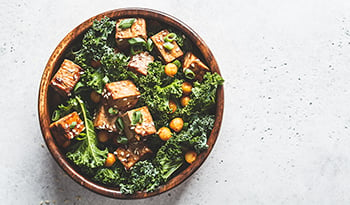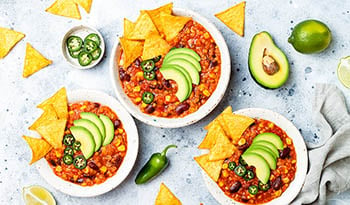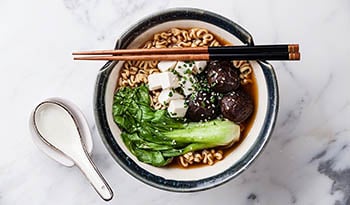Top 7 suplimente pentru a beneficia de o dietă pe bază de plante

Când mulți dintre noi eram copii, consumul de vitamine Flintstones era un punct culminant al rutinei de dimineață. Dar cine spune că distracția trebuie să se termine doar pentru că suntem adulți? A face din vitamine o prioritate zilnică este încă crucială pentru a satisface nevoile noastre nutritive. Păstrați tradiția vie și rămâneți sănătoși cu aceste suplimente vegetariene zilnic.
Există diferite tipuri de suplimente pentru toate stilurile de viață și preferințele alimentare. Unele sunt mai bune pentru consumatorii pe bază de plante, cum ar fi veganii și vegetarienii, în timp ce altele sunt opțiuni excelente pentru toată lumea, indiferent de dietă. Acest articol evidențiază suplimentele de top pentru vegetarieni.
Diferența dintre nevoile vegetariene și non-vegetariene
În ceea ce privește suplimentele, vegetarienii și non-vegetarienii au nevoi de nutrienți ușor diferite. Alimentele pe care le consumați oferă mulți nutrienți importanți - așa că, dacă omiteți anumite grupuri alimentare din dieta dvs., poate fi necesar să obțineți acești nutrienți dintr-un supliment.
Mâncătorii pe bază de plante au adesea dificultăți în a-și satisface cerințele zilnice de nutrienți precum fier , vitamina B12 și acizi grași omega-3 . Acești nutrienți specifici se găsesc în principal în produsele de origine animală, cum ar fi carnea. În timp ce unele opțiuni vegane sunt fortificate, va trebui să citiți eticheta nutrițională pentru a ști sigur.
Suplimentele vegetariene diferă de suplimentele non-vegetariene în două moduri:
- Formulări direcționate: Produsele vegetariene pot fi formulate special pentru a susține nevoile nutritive ale consumatorilor pe bază de plante, cu cantități crescute de nutrienți cheie.
- Ingrediente vegetariene: Suplimentele vegetariene nu conțin ingrediente non-vegetariene. Suplimentele vegane nu conțin ingrediente derivate din animale.
Ce face ca vitaminele să nu fie vegane?
Vitaminele în sine nu sunt în mod inerent non-vegane. Majoritatea sunt fabricate din compuși organici care pot fi sintetizați sau extrași din surse pe bază de plante. Cu toate acestea, unele vitamine pot proveni din produse de origine animală sau pot implica testarea pe animale în producția lor, ceea ce le-ar face să nu fie vegane.
Iată câteva ingrediente comune găsite în suplimentele de vitamine care nu sunt vegane:
- Gelatină: O proteină derivată din colagenul animal, gelatina este adesea folosită ca agent de legare în capsule și gumă.
- Lactoza: Lactoza este un zahăr derivat din lapte și folosit ca umplutură în unele vitamine.
- Ceara de albine: Această ceară naturală de albine este folosită ca acoperire pe unele capsule de vitamine.
- Vitamina D3: Vitamina D3 este adesea derivată din lanolină, o substanță ceroasă găsită în lâna de oaie.
- Uleiul de pește: Uleiul de pește este un ingredient comun în suplimentele omega-3 și nu este vegan.
Din fericire, unele suplimente care de obicei nu sunt vegane au versiuni vegane, cum ar fi vitamina D3 vegană și alge omega-3 . Există multe alternative vegane și în mod natural opțiuni vegane , cum ar fi vitamina D2.
Este întotdeauna cel mai bine să verificați sursa unui supliment și procesul de fabricație înainte de a cumpăra pentru a vă asigura că se aliniază cu alegerile dvs. dietetice. Puteți filtra cu ușurință pentru opțiuni vegetariene sau vegane la iherb.com.
Vitamine și minerale de top pentru vegetarieni + Beneficiile lor
Ca consumator pe bază de plante, este important să vă asigurați că obțineți toți nutrienții necesari pentru a menține sănătatea optimă. În timp ce Academia de Nutriție și Dietetică a descoperit că o dietă vegană bine planificată poate oferi toți nutrienții esențiali, unii vegani pot beneficia de administrarea anumitor suplimente.1 Consultați-vă întotdeauna cu medicul dumneavoastră înainte de a vă schimba rutina suplimentelor.
Acestea sunt suplimentele de top pe care veganii ar trebui să ia în considerare.
1. Vitamina B12
Vitamina B12 se găsește aproape exclusiv în produsele de origine animală, așa că poate fi dificil pentru vegani și unii vegetarieni să obțină suficientă din ea numai din dieta lor. Vitamina B12 este esențială pentru funcția nervoasă, sinteza ADN-ului și producția de celule roșii din sânge. Veganii ar trebui să ia în considerare să ia un supliment de B12 sau să consume alimente fortificate cu B12, cum ar fi laptele pe bază de plante și drojdie nutritivă .
Cele mai frecvente tipuri de suplimente de vitamina B12 sunt:
- Metilcobalamina: O formă de vitamina B12 folosită adesea în suplimentele sublinguale (sub limbă), metilcobalamina poate fi mai ușor absorbită de organism decât cianocobalamina.
- Cianocobalamina: Acesta este cel mai frecvent tip de supliment de vitamina B12 de pe piață și este fabricat sintetic.
- Hidroxocobalamina: Aceasta este o formă naturală de vitamina B12 care este produsă de bacterii. Este adesea folosit în forme injectabile de suplimente B12.
2. Vitamina D
Vitamina D este esențială pentru sănătatea oaselor și funcția imună. În timp ce organismul poate produce vitamina D atunci când pielea este expusă la lumina soarelui, mulți oameni, inclusiv consumatorii pe bază de plante, s-ar putea să nu aibă suficientă expunere la soare pentru a produce suficientă vitamină D.
Majoritatea oamenilor ar trebui să ia în considerare administrarea unui supliment de vitamina D , în special în lunile de iarnă sau dacă locuiesc în zone cu expunere limitată la soare. Limita superioară a vitaminei D este de 4.000 UI pentru adulți, deci evitați depășirea acestui prag, cu excepția cazului în care medicul dumneavoastră recomandă altfel.
3. Acizi grași Omega-3
Acizii grași Omega-3 sunt importanți pentru sănătatea inimii și funcția creierului. Deși pot fi găsite în unele alimente pe bază de plante, cum ar fi semințele de chia și semințele de in, rata de conversie a acestor surse vegetale în forma activă de omega-3 este mai mică. Trebuie să știți cât de mult să consumați zilnic pentru a vă satisface nevoile.
Persoanele care nu primesc suficiente omega-3 prin dieta lor - indiferent dacă sunt vegane sau nu - ar trebui să ia în considerare un supliment omega-3. Suplimentele omega-3 pe bază de plante sunt făcute cu alge în loc de ulei de pește.
4. Fier
Fierul este esențial pentru producerea de globule roșii și transportul oxigenului în organism. În timp ce fierul poate fi găsit în alimentele pe bază de plante, cum ar fi lintea, spanacul și tofu, milioane de americani au un nivel scăzut de fier, indiferent de aportul lor alimentar de fier. Furnizorul dvs. de asistență medicală vă poate recomanda să luați un supliment de fier dacă sunteți expus riscului de deficit de fier.
5. Zinc
Zincul este important pentru funcția imună, vindecarea rănilor și sinteza ADN-ului. Alimentele pe bază de plante, cum ar fi fasolea, nucile și cerealele integrale, toate furnizează zinc - dar mulți dintre noi nu consumăm suficient doar prin dietă. Zincul este deosebit de important în timpul sezonului rece și gripal. Luarea unui supliment de zinc vă poate ajuta să vă asigurați că vă satisfaceți nevoile zilnice.
Adulții ar trebui să evite să ia mai mult de 40 mg de zinc zilnic, deoarece luarea prea mult timp pentru o perioadă lungă de timp poate împiedica capacitatea de a mirosi. Vă puteți suplimenta dieta cu zinc luând un multivitamin vegan .
6. Iod
Iodul este un mineral esențial care joacă un rol crucial în producerea de hormoni tiroidieni de către organism. Acești hormoni sunt necesari pentru creșterea și dezvoltarea corespunzătoare și pentru reglarea metabolismului.
Veganii pot prezenta un risc mai mare de deficit de iod, deoarece multe surse dietetice de iod sunt de origine animală, cum ar fi fructele de mare, produsele lactate și ouăle. Cu toate acestea, mai multe surse de iod pe bază de plante includ alge marine, sare iodată și unele fructe și legume, cum ar fi prunele și fasolea lima. Dacă satisfacerea nevoilor dvs. este o provocare, un supliment de alge poate fi de ajutor.
7. Calciu
Mai multe suplimente de calciu vegane sunt disponibile pentru a ajuta persoanele care sunt vegane sau vegetariene să-și îndeplinească cerințele zilnice de calciu. Iată câteva dintre cele mai populare opțiuni:
- Citrat de calciu: Citrat de calciu este un supliment de calciu utilizat în mod obișnuit, care este ușor absorbit de organism și disponibil sub formă de tabletă sau pulbere. Suplimentele cu citrat de calciu conțin doar 21% calciu, ceea ce înseamnă că poate fi necesar să luați mai mult pentru a vă satisface nevoile zilnice - dar pot fi luate pe stomacul gol și sunt o opțiune mai bună pentru persoanele care iau medicamente pentru reducerea acidului sau arsuri la stomac.
- Carbonat de calciu: Carbonatul de calciu este un alt supliment comun de calciu. Conține aproximativ 40% calciu, cea mai mare cantitate de calciu elementar în greutate. Carbonatul de calciu necesită acid gastric pentru absorbție, deci este mai bine să le luați cu alimente.
- Calciu pe bază de alge: Aceste suplimente sunt derivate din alge și conțin alte minerale importante, cum ar fi magneziu și fier, în plus față de calciu.
- Lapte vegetal fortificat cu calciu: Unele lapte pe bază de plante, inclusiv unele lapte de soia și migdale, sunt fortificate cu calciu. Consumul acestor lapte poate ajuta persoanele să-și satisfacă nevoile zilnice de calciu în afara suplimentelor.
Cum să alegi suplimentele
Cu atât de multe produse pe piață, alegerea suplimentelor de înaltă calitate și sigure poate fi o provocare. Iată câteva sfaturi pentru a vă ajuta să alegeți cele mai bune suplimente:
- Verificați eticheta: Căutați un supliment cu o etichetă care să indice numele, cantitatea ingredientelor, doza recomandată și orice alte informații importante. Eticheta trebuie să indice, de asemenea, că suplimentul a fost testat pentru puritate și potență.
- Alegeți mărci de renume: Cumpărați suplimente de la mărci de renume sau producători cu o bună reputație pentru calitate și siguranță. Căutați mărci certificate de organizații terțe, cum ar fi Farmacopeia Statelor Unite (USP) sau NSF International.
- Cercetați suplimentul: Cercetați un supliment care vă interesează înainte de a-l cumpăra. Căutați studii clinice bine concepute care să susțină eficacitatea și siguranța acestuia. Chiar mai bine, consultați-vă medicul sau un dietetician înregistrat care se poate asigura că suplimentul este sigur și adecvat pentru dvs.
- Consultați întotdeauna furnizorul de asistență medicală: Discutați cu medicul dumneavoastră sau cu un furnizor calificat de asistență medicală înainte de a lua orice suplimente noi. Ei vă pot sfătui cu privire la siguranța și eficacitatea suplimentului și vă pot ajuta să determinați dacă este potrivit pentru dvs.
- Evitați suplimentele cu ingrediente discutabile: Aveți grijă la suplimentele care conțin ingrediente care nu sunt bine reglementate sau care au fost asociate cu riscuri pentru sănătate. Evitați orice amestecuri brevetate care nu enumeră fiecare ingredient din ele.
- Fiți atenți la interacțiunile potențiale: Unele suplimente pot interacționa cu medicamentele eliberate pe bază de rețetă sau cu alte suplimente pe care le luați. Înainte de a începe orice suplimente noi, discutați cu medicul dumneavoastră sau cu un furnizor calificat de asistență medicală despre interacțiunile potențiale.
- Urmați dozele recomandate: respectați doza recomandată de pe etichetă și nu luați mai mult decât cantitatea recomandată. A lua prea multe suplimente poate fi periculos și poate duce la riscuri grave pentru sănătate. De asemenea, verificați etichetele altor suplimente pe care le luați - acestea pot conține unele dintre aceleași vitamine sau minerale și nu doriți să exagerați din greșeală.
În cele din urmă, suplimentele nu ar trebui să înlocuiască o dietă sănătoasă și echilibrată pe bază de plante. Este întotdeauna cel mai bine să folosim o abordare bazată pe mâncare, dar uneori avem nevoie de puțin ajutor și asta este în regulă. Dacă sunteți un consumator pe bază de plante și sunteți îngrijorat de rutina dvs. de suplimente, nu ezitați să cereți ajutor unui profesionist din domeniul sănătății.
Referințe:
- Melina V, Craig W, Levin S. Poziția Academiei de Nutriție și Dietetică: Diete vegetariene. J Acad Nutr Diet. 2016; 116 (12): 1970-1980. doi: 10.1016/j.jand.2016.09.025
Declarație de declinare a responsabilității:Acest blog nu are ca scop să ofere un diagnostic.
















































































 Cuprins
Cuprins















